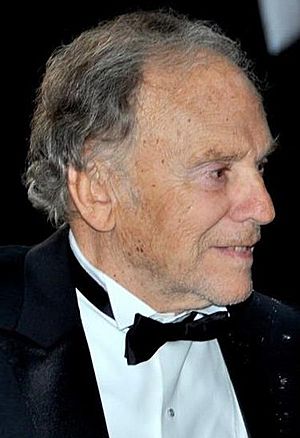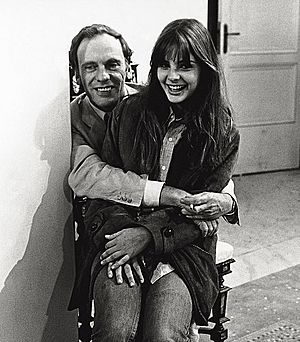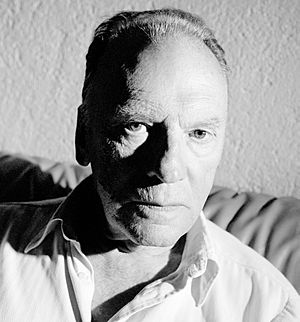Jean-Louis Trintignant facts for kids
Quick facts for kids
Jean-Louis Trintignant
|
|
|---|---|

Trintignant at the 2012 Cannes Film Festival
|
|
| Born |
Jean-Louis Xavier Trintignant
11 December 1930 |
| Died | 17 June 2022 (aged 91) Uzès, France
|
| Alma mater | La Fémis |
| Occupation | Actor, director, producer, racecar driver |
| Years active | 1951–2019 |
| Spouse(s) |
Marianne Hoepfner
(m. 2000) |
| Children | 3, including Marie |
Jean-Louis Trintignant (born December 11, 1930 – died June 17, 2022) was a famous French actor, filmmaker, and racecar driver. He started acting in plays in 1951. Many people thought he was one of the most talented French actors after World War II. He was known for his main roles in many classic European films.
He worked with many important directors like Roger Vadim, Costa-Gavras, Claude Lelouch, Claude Chabrol, Bernardo Bertolucci, Éric Rohmer, François Truffaut, Krzysztof Kieślowski, and Michael Haneke.
Jean-Louis Trintignant became very popular with the movie And God Created Woman (1956). He then starred in the romantic film A Man and a Woman (1966) and The Great Silence (1968). He won the Silver Bear for Best Actor award at the 1968 Berlin Film Festival for his role in The Man Who Lies. He also won the Best Actor award at the 1969 Cannes Film Festival for the film Z.
Some of his other well-known films include My Night at Maud's (1969), The Conformist (1970), Three Colours: Red (1994), and The City of Lost Children (1995). In 2013, he won the César Award for Best Actor for his role in Michael Haneke's film Amour.
Contents
Early Life and Acting Start
Jean-Louis Trintignant was born on December 11, 1930, in Piolenc, France. His father, Raoul Trintignant, was a businessman. Jean-Louis first planned to study law. However, he soon found he loved acting. At age 20, he moved to Paris to study drama. He made his first stage appearance in 1951.
A Look at His Career
After performing in several plays in the early 1950s, Jean-Louis Trintignant appeared in his first movie in 1955. The next year, he became a star. This happened because of his role with Brigitte Bardot in Roger Vadim's film And God Created Woman.
His acting career was paused for a few years when he had to serve in the military. After serving in Algiers, he came back to Paris. He then continued his work in films. He played the main male role in Claude Lelouch's film A Man and a Woman (1966). This movie became one of the most successful French films around the world for many years.
Jean-Louis Trintignant also worked a lot in Italy. He starred in films by Italian directors like Sergio Corbucci (The Great Silence), Valerio Zurlini (Violent Summer), and Bernardo Bertolucci (The Conformist).
During the 1970s, Trintignant appeared in many movies. These included English-language films like The Outside Man (1971) and Under Fire (1983). After this, he starred in François Truffaut's last film, Confidentially Yours. He also returned to his famous role in the sequel A Man and a Woman: 20 Years Later (1986).
In 1994, he starred in Krzysztof Kieślowski's final film, Three Colors: Red. For the rest of his career, he mostly focused on stage acting. He took only a few film roles. After a 14-year break from movies, Trintignant returned to the screen for Michael Haneke's film Amour. Haneke had written the movie especially for him. Trintignant said he chose film projects based on the director. He felt Haneke had amazing control over all parts of filmmaking. He worked with Haneke again in 2017 in the film Happy End.
On July 20, 2018, Trintignant announced he was retiring from movies. But in March 2019, he accepted a role in Claude Lelouch's film The Best Years of a Life. This movie was a follow-up to A Man and a Woman and its sequel.
His Personal Life
Jean-Louis Trintignant came from a well-off family. His uncle, Louis Trintignant, was a racecar driver who sadly died in 1933 during practice. Another uncle, Maurice Trintignant, was also a famous Formula One driver. Maurice won the Monaco Grand Prix twice and also the 24 Hours of Le Mans.
Jean-Louis himself loved rally driving as a hobby. He took part in several high-level rallies in the 1970s and 1980s. He even finished first in his class at the 1981 Monte Carlo Rally. Because he grew up around car racing, director Claude Lelouch chose him to play a racecar driver in the 1966 film A Man and a Woman. In June 2007, he hurt his leg in a motorbike accident.
His first wife was actress Stéphane Audran. His second wife, Nadine Marquand, was an actress, screenwriter, and director. They had three children: Vincent, Pauline, and Marie Trintignant. Sadly, Pauline died as a baby in 1969. Marie became a successful actress, performing with her father in La terrazza when she was 17. She passed away at age 41.
In 2018, Trintignant shared that he had cancer and chose not to get treatment. In November 2021, it was reported that he was slowly losing his eyesight and his health was getting worse. He died at his home on June 17, 2022, at the age of 91.
Filmography
| Year | Title | Role | Director | Notes |
|---|---|---|---|---|
| 1955 | If All the Guys in the World | Jean-Louis | Christian-Jaque | |
| 1956 | La Loi des rues | Yves Tréguier | Ralph Habib | |
| And God Created Woman | Michel Tardieu | Roger Vadim | ||
| Women's Club | Michel | Ralph Habib | ||
| 1959 | Les liaisons dangereuses | Danceny | Roger Vadim | |
| Violent Summer | Carlo Caremoli | Valerio Zurlini | ||
| 1960 | Austerlitz | Ségur junior | Abel Gance | |
| 1961 | Pleins feux sur l'assassin | Jean-Marie de Kerloguen | Georges Franju | |
| Journey Beneath the Desert | Pierre | Edgar G. Ulmer | ||
| 1962 | Horace 62 | Joseph Fabiani | André Versini | |
| Le Combat dans l'île | Clément Lesser | Alain Cavalier | ||
| Il Sorpasso | Roberto Mariani | Dino Risi | ||
| 1963 | Château en Suède | Éric | Roger Vadim | |
| 1964 | Mata Hari, Agent H21 | François Lasalle | Jean-Louis Richard | |
| 1965 | The Sleeping Car Murders | Éric Grandin | Costa-Gavras | |
| 1966 | A Man and a Woman | Jean-Louis Duroc | Claude Lelouch | |
| Diamond Safari | Raphaële Vincente | Michel Drach | ||
| La Longue Marche | Philippe | Alexandre Astruc | ||
| Trans-Europ-Express | Elias | Alain Robbe-Grillet | ||
| 1967 | Un homme à abattre | Raphaël | Philippe Condroyer | |
| Col cuore in gola | Bernard | Tinto Brass | ||
| My Love, My Love | Vincent Falaise | Nadine Trintignant | ||
| 1968 | Death Laid an Egg | Marco | Giulio Questi | |
| Les Biches | Paul Thomas | Claude Chabrol | ||
| The Man Who Lies | Jan Robin / Boris Varissa | Alain Robbe-Grillet | ||
| The Great Silence | Gordon ("Silence") | Sergio Corbucci | ||
| The Libertine | Carlo De Marchi | Pasquale Festa Campanile | ||
| 1969 | Z | Christos Sartzetakis | Costa-Gavras | |
| Metti, una sera a cena | Michele | Giuseppe Patroni Griffi | ||
| My Night at Maud's | Jean-Louis | Éric Rohmer | ||
| L'Américain | Bruno | Marcel Bozzuffi | ||
| So Sweet... So Perverse | Jean Reynaud | Umberto Lenzi | ||
| 1970 | The Conformist | Marcello Clerici | Bernardo Bertolucci | |
| Le Voyou | Simon Duroc | Claude Lelouch | ||
| 1971 | Ramparts of Clay | the entrepreneur | Jean-Louis Bertucelli | |
| L'Opium et le Bâton | Chaudier | Ahmed Rachedi | ||
| Without Apparent Motive | Stéphane Carella | Philippe Labro | ||
| 1972 | ...and Hope to Die | Antoine Cardot | René Clément | |
| Plot | François Darien | Yves Boisset | ||
| The Outside Man | Lucien Bellon | Jacques Deray | ||
| 1973 | The Train | Julien Maroyeur | Pierre Granier-Deferre | |
| A Full Day's Work | directed | |||
| 1974 | Violins at the Ball | Michel | Michel Drach | |
| Successive Slidings of Pleasure | the police officer | Alain Robbe-Grillet | ||
| Le Mouton enragé | Nicolas Mallet | Michel Deville | ||
| The Secret | David Daguerre | Robert Enrico | ||
| 1975 | L'Agression | Paul Varlin | Gérard Pirès | |
| Flic Story | Émile Buisson | Jacques Deray | ||
| Il pleut sur Santiago | Senator | Helvio Soto | ||
| Playing with Fire | le bel homme / l'homme de main | Alain Robbe-Grillet | ||
| The Sunday Woman | Massimo Campi | Luigi Comencini | ||
| 1976 | The Desert of the Tartars | Rovin | Valerio Zurlini | |
| 1977 | The Passengers | Alex Moineau | Serge Leroy | |
| Repérages | Victor | Michel Soutter | ||
| 1978 | L'Argent des autres | Henri Rainier | Christian de Chalonge | |
| 1980 | The Lady Banker | Horace Vannister | Francis Girod | |
| La terrazza | Enrico D'Orsi | Ettore Scola | ||
| Je vous aime | Julien | Claude Berri | ||
| 1981 | Un assassin qui passe | Ravic | Michel Vianey | |
| Passion of Love | the doctor | Ettore Scola | ||
| Malevil | Fulbert | Christian de Chalonge | ||
| Eaux profondes | Vic Allen | Michel Deville | ||
| 1982 | Le Grand Pardon | Commissaire Duché | Alexandre Arcady | |
| Boulevard des assassins | Daniel Salmon | Boramy Tioulong | ||
| Blow to the Heart | Dario | Gianni Amelio | ||
| The Night at Varennes | Monsieur Sauce | Ettore Scola | ||
| 1983 | Confidentially Yours | Julien Vercel | François Truffaut | |
| La Crime | Christian Lacassagne | Philippe Labro | ||
| Under Fire | Marcel Jazy | Roger Spottiswoode | ||
| 1984 | Viva la vie! | François Gaucher | Claude Lelouch | |
| 1985 | Next Summer | Paul | Nadine Trintignant | |
| Partir, revenir | Roland Rivière | Claude Lelouch | ||
| Rendez-vous | Scrutzler | André Téchiné | ||
| L'Homme aux yeux d'argent | Mayene | Pierre Granier-Deferre | ||
| 1986 | A Man and a Woman: 20 Years Later | Jean-Louis Duroc | Claude Lelouch | |
| La Femme de ma vie | Pierre | Régis Wargnier | ||
| 1987 | La vallée fantôme | Paul | Alain Tanner | |
| 1989 | Bunker Palace Hôtel | Holm | Enki Bilal | |
| 1991 | Merci la vie | SS officier | Bertrand Blier | |
| 1994 | Three Colors: Red | Joseph Kern | Krzysztof Kieślowski | |
| 1995 | The City of Lost Children | L'oncle Irvin | Jean-Pierre Jeunet and Marc Caro | Voice Only |
| Fiesta | Colonel Masagual | Pierre Boutron | ||
| 1996 | A Self Made Hero | Albert Dehousse (the matured one) | Jacques Audiard | |
| 1998 | Those Who Love Me Can Take the Train | Lucien Emmerich / Jean-Baptiste Emmerich | Patrice Chéreau | |
| 2003 | Janis et John | Monsieur Cannon | Samuel Benchetrit | |
| 2012 | Amour | Georges | Michael Haneke | |
| 2017 | Happy End | Georges Laurent | Michael Haneke | |
| 2019 | The Best Years of a Life | Jean-Louis Duroc | Claude Lelouch |
Awards and Special Mentions
Jean-Louis Trintignant won several important awards for his acting:
| Year | Award | Category | Nominated work | Result | Ref. |
|---|---|---|---|---|---|
| 1968 | Berlin International Film Festival | Silver Bear for Best Actor | The Man Who Lies | Won | |
| 1969 | Cannes Film Festival | Best Actor | Z | Won | |
| 1986 | César Award | Best Supporting Actor | La Femme de ma vie | Nominated | |
| 1994 | Best Actor | Three Colors: Red | Nominated | ||
| 1995 | Best Actor | Fiesta | Nominated | ||
| 1998 | Best Supporting Actor | Those Who Love Me Can Take the Train | Nominated | ||
| 2012 | Best Actor | Amour | Won | ||
| European Film Award | Best Actor | Won | |||
| Lumières Award | Best Actor | Won | |||
| Globes de Cristal Award | Best Actor | Nominated | |||
| International Cinephile Society Award | Best Actor | Nominated | |||
| London Film Critics Circle Award | Best Actor of the Year | Nominated |
- Trintignant was nominated for the César Award five times: in 1987, 1995, 1996, 1999, and in 2013.
See also
 In Spanish: Jean-Louis Trintignant para niños
In Spanish: Jean-Louis Trintignant para niños
 | Charles R. Drew |
 | Benjamin Banneker |
 | Jane C. Wright |
 | Roger Arliner Young |



